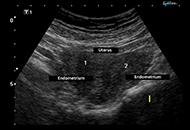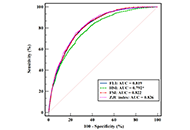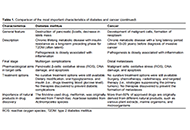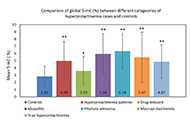Diabetes and cancer: two epidemic diseases requiring an opposite therapeutic approach to target cells
Diabetes and cancer are two chronic metabolic diseases with ever-increasing incidence rates worldwide. These disorders can often occur together, as diabetes presents an important risk factor for can
[...] Read more.
Diabetes and cancer are two chronic metabolic diseases with ever-increasing incidence rates worldwide. These disorders can often occur together, as diabetes presents an important risk factor for cancer and some cancers could in turn lead to diabetes. In this perspective article, many more commonalities between diabetes and cancer are highlighted, including the role of lifestyle and environmental factors in the pathogenesis, the presence of a rather long latency period before clinical diagnosis of invasive disease, as well as the ultimate progression to diabetic complications or malignant metastases. Moreover, both of these devastating disorders still lack curative treatment options, whereas several currently approved antidiabetic and anticancer drugs have been originally derived from different natural sources. However, while in the case of diabetes, the main therapeutic goal is to maintain the pancreatic islet mass by preserving β-cells survival, the major purpose of cancer therapy is to kill malignant cells and reduce the neoplastic mass of solid tumors. It is expected that both diabetes and cancer, two systemic diseases with epidemic proportions, would be managed more effectively through an integral approach, considering many different aspects related to their pathogenesis, including also lifestyle changes and dietary modifications.
Katrin Sak
View:1116
Download:19
Times Cited: 0
Diabetes and cancer are two chronic metabolic diseases with ever-increasing incidence rates worldwide. These disorders can often occur together, as diabetes presents an important risk factor for cancer and some cancers could in turn lead to diabetes. In this perspective article, many more commonalities between diabetes and cancer are highlighted, including the role of lifestyle and environmental factors in the pathogenesis, the presence of a rather long latency period before clinical diagnosis of invasive disease, as well as the ultimate progression to diabetic complications or malignant metastases. Moreover, both of these devastating disorders still lack curative treatment options, whereas several currently approved antidiabetic and anticancer drugs have been originally derived from different natural sources. However, while in the case of diabetes, the main therapeutic goal is to maintain the pancreatic islet mass by preserving β-cells survival, the major purpose of cancer therapy is to kill malignant cells and reduce the neoplastic mass of solid tumors. It is expected that both diabetes and cancer, two systemic diseases with epidemic proportions, would be managed more effectively through an integral approach, considering many different aspects related to their pathogenesis, including also lifestyle changes and dietary modifications.
 Hypoparathyroidism, deafness and renal dysplasia syndrome with bilateral cataract and bicornuate uterus caused by a de novo GATA3 mutationOpen AccessCase ReportHypoparathyroidism, deafness and renal dysplasia (HDR) syndrome is a rare genetic disorder caused by haploinsufficiency of the GATA3 gene. A very limited number of cases have been reported in the li [...] Read more.Rajesh Chetiwal ... Priyank RastogiPublished: May 27, 2024 Explor Endocr Metab Dis. 2024;1:77–82
Hypoparathyroidism, deafness and renal dysplasia syndrome with bilateral cataract and bicornuate uterus caused by a de novo GATA3 mutationOpen AccessCase ReportHypoparathyroidism, deafness and renal dysplasia (HDR) syndrome is a rare genetic disorder caused by haploinsufficiency of the GATA3 gene. A very limited number of cases have been reported in the li [...] Read more.Rajesh Chetiwal ... Priyank RastogiPublished: May 27, 2024 Explor Endocr Metab Dis. 2024;1:77–82 Four hepatic steatosis indices in predicting quantitative computed tomography-based metabolic dysfunction-associated fatty liver diseaseOpen AccessOriginal ArticleAim: To evaluate the prediction ability for quantitative computed tomography (QCT)-based metabolic dysfunction-associated fatty liver disease (MAFLD) of four widely known hepatic steatosis algori [...] Read more.Bingwu Xu ... Yong ZhangPublished: May 23, 2024 Explor Endocr Metab Dis. 2024;1:62–76
Four hepatic steatosis indices in predicting quantitative computed tomography-based metabolic dysfunction-associated fatty liver diseaseOpen AccessOriginal ArticleAim: To evaluate the prediction ability for quantitative computed tomography (QCT)-based metabolic dysfunction-associated fatty liver disease (MAFLD) of four widely known hepatic steatosis algori [...] Read more.Bingwu Xu ... Yong ZhangPublished: May 23, 2024 Explor Endocr Metab Dis. 2024;1:62–76 Diabetes and cancer: two epidemic diseases requiring an opposite therapeutic approach to target cellsOpen AccessPerspectiveDiabetes and cancer are two chronic metabolic diseases with ever-increasing incidence rates worldwide. These disorders can often occur together, as diabetes presents an important risk factor for can [...] Read more.Katrin SakPublished: May 23, 2024 Explor Endocr Metab Dis. 2024;1:56–61
Diabetes and cancer: two epidemic diseases requiring an opposite therapeutic approach to target cellsOpen AccessPerspectiveDiabetes and cancer are two chronic metabolic diseases with ever-increasing incidence rates worldwide. These disorders can often occur together, as diabetes presents an important risk factor for can [...] Read more.Katrin SakPublished: May 23, 2024 Explor Endocr Metab Dis. 2024;1:56–61 Epigenetics in etiopathology of hyperprolactinemiaOpen AccessOriginal ArticleAim: Epigenetic alterations have been reported in patients with pituitary tumors and those on antipsychotic drugs, which are also responsible for hyperprolactinemia. This suggests a possible role [...] Read more.Amanpreet Kaur Kalsi ... Jai Bhagwan SharmaPublished: May 22, 2024 Explor Endocr Metab Dis. 2024;1:39–55
Epigenetics in etiopathology of hyperprolactinemiaOpen AccessOriginal ArticleAim: Epigenetic alterations have been reported in patients with pituitary tumors and those on antipsychotic drugs, which are also responsible for hyperprolactinemia. This suggests a possible role [...] Read more.Amanpreet Kaur Kalsi ... Jai Bhagwan SharmaPublished: May 22, 2024 Explor Endocr Metab Dis. 2024;1:39–55